-
 More of Moore '64
More of Moore '64 In 1962, Arch Moore's 1st Congressional district was merged with the 3rd District of longtime Democratic incumbent Cleveland M. Bailey; Moore won the seat by just 762 votes. He would go on to win re-election in 1964, the year in which this campaign banner was used. Although there is not much wording on this banner, it is comprised of two contrasting colors, black and yellow, and designed to catch peoples' eyes. The slogan, "More of Moore in '64" is an excellent use of rhyme and meter to make it memorable. Much like the famous slogan of President Eisenhower, "I like Ike," the catchy slogans tend to be the most memorable. The similarities between Eisenhower's slogan and Moore's slogan is not too surprising; Eisenhower was President when Moore ran his first successful campaign.
-
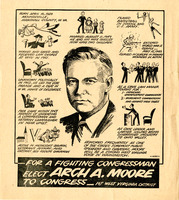 Moore Campaign Poster
Moore Campaign Poster Much can be learned about Arch Alfred Moore from this U.S. Representative campaign poster. He was born in Moundsville, West Virginia, on April 16, 1923. He served and was wounded in combat during World War II. In 1954, Moore lost a very close congressional race to Democratic incumbent Bob Mollohan. This poster, from his successful congressional campaign in 1956 after Mollohan stepped down from his position, portrays all the positive aspects about why Arch Moore was a solid candidate for the office. This poster is unique in that there is no direct comparison to any other political poster of the 1950s. It is rather wordy, does not have a catchy slogan, and is sketched out instead of having an image of the candidate, as was common. Despite that, it offers a lot of information on the candidate, emphasizing Moore's loyalty to the nation and his state.
-
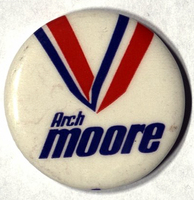 Arch Moore Campaign Button
Arch Moore Campaign Button Campaign button from Governor Arch Moore's political campaigns.
Arch Alfred Moore Jr. was born into Republican politics in Moundsville, WV, on April 16, 1923, the grandson of the mayor and the nephew of a minority leader in the House of Delegates.
He attended Lafayette College in Pennsylvania before being drafted into the Army in World War II. He was awarded a Bronze Star and Purple Heart after being wounded in Europe. After the war, he graduated from West Virginia University and its law school and joined the family law firm.
Moore is the only West Virginia governor to serve three full terms, beginning in 1969, and the first sitting governor of the state to be formally charged with a crime. He was one of two Republicans to be elected governor of West Virginia in more than 80 years. A constitutional amendment passed in 1970, allowing him to become the first West Virginia in a century to succeed himself.
In 1978, Mr. Moore challenged incumbent senator, Jennings Randolph. Moore was outspent 5 to 1, but lost by fewer than 5,000 votes. He ran again for governor in 1980, losing to incumbent John D. Rockefeller IV, but regained the office four years later, defeating Democrat Clyde M. See Jr.
His tenure as governor was notable for road and bridge building projects, raises for teachers, improved benefits for welfare recipients and designation of black lung disease as a mining disability.
-
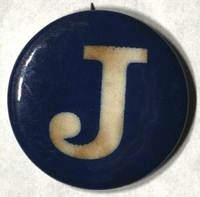 "J" Campaign Button
"J" Campaign Button Campaign button from one Senator Rockefeller IV's political campaigns.
Senator Rockefeller served six-terms as senator, and much of the items in this exhibit focus on this time. However, Rockefeller also served two terms as West Virginia's governor.
In January 1972, Rockefeller announced his candidacy for governor and overwhelmed his two opponents in the primary, setting up a fierce contest against popular incumbent Arch Moore. In the general election Moore defeated Rockefeller by 73,355 votes.
Governor Arch Moore was not allowed to run for a third consecutive term, and in 1976, Rockefeller carried every county but Barbour and Monroe.
During his first term , large segments of state government were reorganized to include the state Department of Health, the Department of Culture and History (now Department of Arts, Culture and History), and the creation of a state Department of Economic and Community Development. Rockefeller’s establishment of the position of special assistant to the governor for economic and community development was his attempt to fulfill a campaign promise to give priority to economic development. Among his achievements was the location of a $500 million coal liquefaction demonstration plant in Morgantown. However, ht also had to deal with heavy snowfalls across the state, acute fuel shortages, floods, and 111 day coal strike. In 1980, Rockefeller faced Arch Moore again. This time, Rockefeller outspent Moore 12 to 1, and won with 64, 500 votes. The state went into a recession during his second term, and in 1984 he started his U.S. Senate career.
-
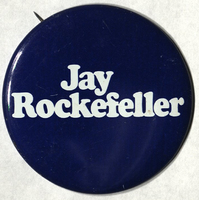 Jay Rockefeller Campaign Button
Jay Rockefeller Campaign Button Campaign button from one of Senator Rockefeller IV's political campaigns.
-
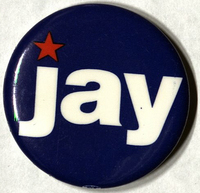 Jay "Star" Campaign Button
Jay "Star" Campaign Button Campaign button from one of Senator Rockefeller IV's campaigns for re-election to the U.S. Senate.
-
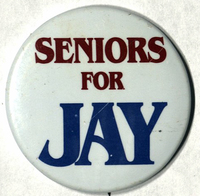 Seniors for Jay
Seniors for Jay Campaign button for seniors from one of Senator Rockefeller IV's campaigns.
Senior citizens are an important voting block. For almost 40 years, voters aged 45 and over have turned out far more than younger Americans. In the 2016 presidential election, 71 percent of Americans over 65 voted. For much of Senator Rockefeller's career, he focused on improving America's healthcare system. As part of the Finance Committee, he worked to ensure that Medicare health insurance premiums were affordable for senior citizens. While senior citizens surely look at issues other than "senior issues," such as Medicare and Social Security, in many of Senator Rockefeller's campaigns, he highlighted his record for fighting for affordable healthcare.
-
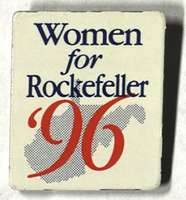 Women for Rockefeller '96
Women for Rockefeller '96 Campaign button for women from U.S. Senator Rockefeller IV's 1996 re-election campaign.
Senator Rockefeller won his 1996 re-election bid easily. In the Democratic primary, he easily beat janitor Bruce Barilla with roughly 84 percent of the vote. In the general election, he was challenged by McDowell County resident, Betty Burks. She admitted it was a 'little odd' for her to run against the two-time incumbent, but that she wanted to make sure that no one forgot about 'them'. Her campaign slogan was 'We Love Where We Live – Let's Make it Better!". Senator Rockefeller easily won the general election with over 75 percent of the vote.
The Women for Rockefeller committee highlighted Rockefeller’s initiatives to improve health care, provide opportunities for children, and bring economic opportunity to West Virginia. They also highlighted how he expanded veterans' benefits to account for the special health needs women veterans face, and that he would continue to fight for higher salaries and less expensive training for traditionally female professions, like teaching and nursing. This committee was present in most of Senator Rockefeller's campaigns.
-
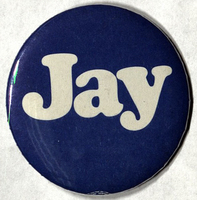 Jay Campaign Button
Jay Campaign Button Campaign button from one of Senator Rockefeller IV's campaigns.
Why "Jay"?
Senator Rockefeller is not the only person to use a first name, or nickname on the campaign trail. For example, former President Dwight "Ike" Eisenhower's campaign slogan while running for president was the popular "I Like Ike". Former United States Secretary of State, and 2016 Democratic Presidential Nominee, Hillary Clinton, has used her first name for campaigning since launching her political career with her campaign for Senator of New York in 2000. Former Florida Governor Jeb Bush's campaign used "Jeb!" as the campaign logo in Florida elections as well as his bid for president in 2016. Similarly, Kentucky Senator Rand Paul's campaign logo consists of his first name.
One theory is that all of these politicians (except for Ike) come from political dynasties, and use their first names to separate themselves from their family name or reputations. Hillary Clinton's husband, Bill Clinton, was president from 1993-2001. Jeb Bush's brother, George W. Bush, and father, George Bush were also United States presidents. Senator Rand Paul's father, Ron Paul, was Congressman for the state of Texas for 23 years, was a presidential candidate, and has a very large libertarian base.
Senator Rockefeller is the great-grandson and namesake of John D. Rockefeller, founder of the Standard Oil Company and patriarch of one of America's most famous dynasties. His uncle, Nelson Rockefeller served as governor of New York and vice president of the United States.
-
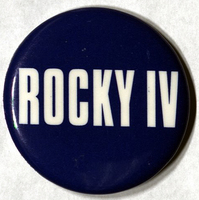 Rocky IV Campaign Button
Rocky IV Campaign Button Campaign button for one of Senator Jay Rockefeller IV's campaigns. Date is unknown, but may have come from Rockefeller's first campaign for U.S. Senator in 1984 against Republican businessman John Rease. This was the year leading up to the release of the popular movie Rocky IV.
-
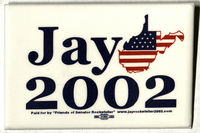 Jay 2002 Campaign Button
Jay 2002 Campaign Button Campaign button from Senator Rockefeller IV's 2002 re-election campaign against Republican businessman Jay Wolfe. Senator Rockefeller won the general election with 63 percent of the vote.
On October 28, 2002, the Martinsburg Journal released an article endorsing Senator Rockefeller for the 2002 West Virginia U.S. Senate Election. The article credits Senator Rockefeller for thousands of dollars of economic development in the Eastern Panhandle alone, with the Tiger and Sino-Swearingen aircraft companies anchoring the industrial park at the Eastern Regional Airport. The article also deemed him responsible for keeping the General Motors plant in Martinsburg. The article highlighted the Toyota engine manufacturing plant that was secured in Buffalo, WV, and how he had led a marketing team to Japan, selling West Virginia to Japanese investors. The article also mentioned his tenure on the Veterans' Affairs Committee and how he had looked out for West Virginia veterans and the VA Medical Center in Martinsburg. His high ranking spot on the Senate Intelligence Committee, and his support for education and research at that state’s schools of higher education, was also mentioned before urging Martinsburg residents to "return Rockefeller to the U.S. Senate for another term for the good of West Virginia."
The Charleston Gazette released an article endorsing Rockefeller for the U.S. Senate seat. The article admitted that he would easily win the election, and didn't need their support, but they wanted to recommend him anyway. The article discussed how, despite Rockefeller’s wealth, he worked tirelessly for the interests of "little people," and highlighted how he was instrumental in persuading Toyota to open the Buffalo plant.
-
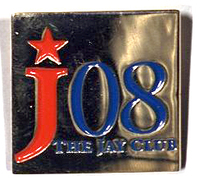 j08 Campaign Button
j08 Campaign Button Campaign button from Senator Rockefeller IV's 2008 re-election campaign against Republican businessman Jay Wolfe.
During the 2008 campaign, Senator Rockefeller endorsed Barack Obama for president in West Virginia. He was quoted by the Herald Dispatch on October 25, 2008, "We can win West Virginia for Barack Obama and Joe Biden; McCain has nothing to offer us". Rockefeller reportedly made this statement at a monthly Cabell County Democratic Women's Club Meeting. Rockefeller won re-election with 67.3 percent of the votes. However, Senator John McCain won West Virginia with 55.7 percent of the votes.
The Democrats gained 7 Senate seats in the 2008 election, increasing the Democratic majority to 58 Democrats and 41 Republicans. The voter turnout in the United States was 61.6 percent, the highest turnout rate since 1968. Turnout increased for the third straight general election. In West Virginia, the voter turnout was 57.9 percent, which was roughly a 3 percent increase from 2004, and over 10 percent increase from 2000.
-
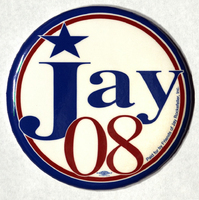 Jay '08 Campaign Button
Jay '08 Campaign Button Campaign button from Senator Rockefeller IV's 2008 re-election campaign against Republican businessman Jay Wolfe.
U.S. Senator John D. Rockefeller (D) ran for re-election in 2008 against Republican business owner Jay Wolfe. Senator Rockefeller focused on his successful record as Senator on a number of issues during his campaign. For example, he pointed to added jobs and economic growth in West Virginia. Most notably, Toyota's decision to locate an engine plant in Buffalo, West Virginia. By this time, the plant had expanded 6 times in the past decade, and created 1,300 jobs. The Senator also touted his co-authorship of the State Children and Health Insurance Program, passed in 1997, and his long-term leadership as a Senior Democrat on the Veterans' Committee. He vowed to continue to fight in the Finance Committee to keep Medicare premium costs affordable for seniors, and to stand with coal miners to pass legislation that kept miners safe and saved health care benefits for when they retired.
-
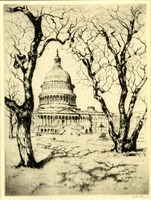 Sketch of U.S. Capitol
Sketch of U.S. Capitol
-
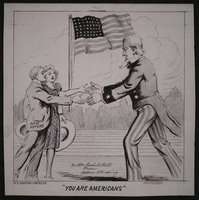 "You Are Americans" cartoon
"You Are Americans" cartoon This political cartoon depicts Uncle Sam embracing two new voters. Underneath the scene the cartoon reads, "You are Americans." Pulitzer prize-winning cartoonist Nelson Harding signed the cartoon "To Hon. Rush D. Holt."
-
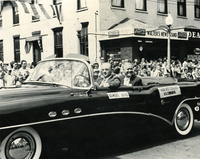 Photograph of Harley O. Staggers Sr. riding in a parade
Photograph of Harley O. Staggers Sr. riding in a parade
-
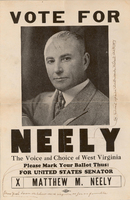 Matthew Mansfield Neely campaign poster
Matthew Mansfield Neely campaign poster
-
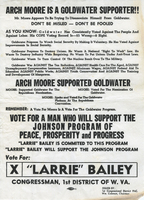 "Arch Moore is a Goldwater Support!! Vote Larry Bailey" flyer
"Arch Moore is a Goldwater Support!! Vote Larry Bailey" flyer
-
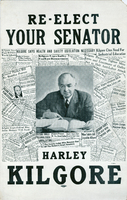 Kilgore campaign poster
Kilgore campaign poster
-
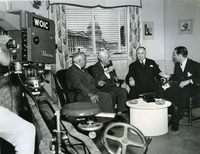 Senator Matthew Neely (D-WV) (second from right) being interviewed on WOIC-TV in Washington, DC
Senator Matthew Neely (D-WV) (second from right) being interviewed on WOIC-TV in Washington, DC
-
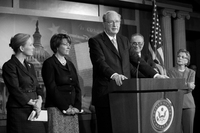 Photograph of Senator Jay Rockefeller (D-WV) at a press conference with other Commerce Committee Democrats
Photograph of Senator Jay Rockefeller (D-WV) at a press conference with other Commerce Committee Democrats
-
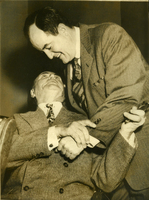 Photograph of Senators Matthew Neely and Hubert Humphrey greeting each other at a meeting of the Senate Democrats on the eve of the opening of the 84th Congress
Photograph of Senators Matthew Neely and Hubert Humphrey greeting each other at a meeting of the Senate Democrats on the eve of the opening of the 84th Congress
-
 Photograph of Senate Intelligence Committee nomination hearing for General David Petraeus to Director of the Central Intelligence Agency
Photograph of Senate Intelligence Committee nomination hearing for General David Petraeus to Director of the Central Intelligence Agency
-
 Photograph of Congressmen Nick Rahall and House Majority Whip Tony Coelho
Photograph of Congressmen Nick Rahall and House Majority Whip Tony Coelho
-
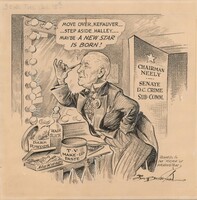 Cartoon featuring Senator Matthew Neely
Cartoon featuring Senator Matthew Neely This cartoon features Senator Matthew Mansfield Neely applying TV makeup in a mirror. The door reads "Chairman Neely: Senate D.C. Crime Sub-Comm." A thought bubble reads, "Move over Kefauver...Step aside Halley...Maybe...A New Star is Born!" Neely served as chairman of the Senate Committee on the District of Columbia throughout the 1950s, but the cartoon seems to allude to the Special Committee on Organized Crime in Interstate Commerce, which made Chairman Estes Kefauver something of a television star. The cartoonist, Pulitzer prize winning Jim Berryman, wrote: "Regards to the Mayor of Washington."
 More of Moore '64 In 1962, Arch Moore's 1st Congressional district was merged with the 3rd District of longtime Democratic incumbent Cleveland M. Bailey; Moore won the seat by just 762 votes. He would go on to win re-election in 1964, the year in which this campaign banner was used. Although there is not much wording on this banner, it is comprised of two contrasting colors, black and yellow, and designed to catch peoples' eyes. The slogan, "More of Moore in '64" is an excellent use of rhyme and meter to make it memorable. Much like the famous slogan of President Eisenhower, "I like Ike," the catchy slogans tend to be the most memorable. The similarities between Eisenhower's slogan and Moore's slogan is not too surprising; Eisenhower was President when Moore ran his first successful campaign.
More of Moore '64 In 1962, Arch Moore's 1st Congressional district was merged with the 3rd District of longtime Democratic incumbent Cleveland M. Bailey; Moore won the seat by just 762 votes. He would go on to win re-election in 1964, the year in which this campaign banner was used. Although there is not much wording on this banner, it is comprised of two contrasting colors, black and yellow, and designed to catch peoples' eyes. The slogan, "More of Moore in '64" is an excellent use of rhyme and meter to make it memorable. Much like the famous slogan of President Eisenhower, "I like Ike," the catchy slogans tend to be the most memorable. The similarities between Eisenhower's slogan and Moore's slogan is not too surprising; Eisenhower was President when Moore ran his first successful campaign. Moore Campaign Poster Much can be learned about Arch Alfred Moore from this U.S. Representative campaign poster. He was born in Moundsville, West Virginia, on April 16, 1923. He served and was wounded in combat during World War II. In 1954, Moore lost a very close congressional race to Democratic incumbent Bob Mollohan. This poster, from his successful congressional campaign in 1956 after Mollohan stepped down from his position, portrays all the positive aspects about why Arch Moore was a solid candidate for the office. This poster is unique in that there is no direct comparison to any other political poster of the 1950s. It is rather wordy, does not have a catchy slogan, and is sketched out instead of having an image of the candidate, as was common. Despite that, it offers a lot of information on the candidate, emphasizing Moore's loyalty to the nation and his state.
Moore Campaign Poster Much can be learned about Arch Alfred Moore from this U.S. Representative campaign poster. He was born in Moundsville, West Virginia, on April 16, 1923. He served and was wounded in combat during World War II. In 1954, Moore lost a very close congressional race to Democratic incumbent Bob Mollohan. This poster, from his successful congressional campaign in 1956 after Mollohan stepped down from his position, portrays all the positive aspects about why Arch Moore was a solid candidate for the office. This poster is unique in that there is no direct comparison to any other political poster of the 1950s. It is rather wordy, does not have a catchy slogan, and is sketched out instead of having an image of the candidate, as was common. Despite that, it offers a lot of information on the candidate, emphasizing Moore's loyalty to the nation and his state. Arch Moore Campaign Button Campaign button from Governor Arch Moore's political campaigns. Arch Alfred Moore Jr. was born into Republican politics in Moundsville, WV, on April 16, 1923, the grandson of the mayor and the nephew of a minority leader in the House of Delegates. He attended Lafayette College in Pennsylvania before being drafted into the Army in World War II. He was awarded a Bronze Star and Purple Heart after being wounded in Europe. After the war, he graduated from West Virginia University and its law school and joined the family law firm. Moore is the only West Virginia governor to serve three full terms, beginning in 1969, and the first sitting governor of the state to be formally charged with a crime. He was one of two Republicans to be elected governor of West Virginia in more than 80 years. A constitutional amendment passed in 1970, allowing him to become the first West Virginia in a century to succeed himself. In 1978, Mr. Moore challenged incumbent senator, Jennings Randolph. Moore was outspent 5 to 1, but lost by fewer than 5,000 votes. He ran again for governor in 1980, losing to incumbent John D. Rockefeller IV, but regained the office four years later, defeating Democrat Clyde M. See Jr. His tenure as governor was notable for road and bridge building projects, raises for teachers, improved benefits for welfare recipients and designation of black lung disease as a mining disability.
Arch Moore Campaign Button Campaign button from Governor Arch Moore's political campaigns. Arch Alfred Moore Jr. was born into Republican politics in Moundsville, WV, on April 16, 1923, the grandson of the mayor and the nephew of a minority leader in the House of Delegates. He attended Lafayette College in Pennsylvania before being drafted into the Army in World War II. He was awarded a Bronze Star and Purple Heart after being wounded in Europe. After the war, he graduated from West Virginia University and its law school and joined the family law firm. Moore is the only West Virginia governor to serve three full terms, beginning in 1969, and the first sitting governor of the state to be formally charged with a crime. He was one of two Republicans to be elected governor of West Virginia in more than 80 years. A constitutional amendment passed in 1970, allowing him to become the first West Virginia in a century to succeed himself. In 1978, Mr. Moore challenged incumbent senator, Jennings Randolph. Moore was outspent 5 to 1, but lost by fewer than 5,000 votes. He ran again for governor in 1980, losing to incumbent John D. Rockefeller IV, but regained the office four years later, defeating Democrat Clyde M. See Jr. His tenure as governor was notable for road and bridge building projects, raises for teachers, improved benefits for welfare recipients and designation of black lung disease as a mining disability. "J" Campaign Button Campaign button from one Senator Rockefeller IV's political campaigns. Senator Rockefeller served six-terms as senator, and much of the items in this exhibit focus on this time. However, Rockefeller also served two terms as West Virginia's governor. In January 1972, Rockefeller announced his candidacy for governor and overwhelmed his two opponents in the primary, setting up a fierce contest against popular incumbent Arch Moore. In the general election Moore defeated Rockefeller by 73,355 votes. Governor Arch Moore was not allowed to run for a third consecutive term, and in 1976, Rockefeller carried every county but Barbour and Monroe. During his first term , large segments of state government were reorganized to include the state Department of Health, the Department of Culture and History (now Department of Arts, Culture and History), and the creation of a state Department of Economic and Community Development. Rockefeller’s establishment of the position of special assistant to the governor for economic and community development was his attempt to fulfill a campaign promise to give priority to economic development. Among his achievements was the location of a $500 million coal liquefaction demonstration plant in Morgantown. However, ht also had to deal with heavy snowfalls across the state, acute fuel shortages, floods, and 111 day coal strike. In 1980, Rockefeller faced Arch Moore again. This time, Rockefeller outspent Moore 12 to 1, and won with 64, 500 votes. The state went into a recession during his second term, and in 1984 he started his U.S. Senate career.
"J" Campaign Button Campaign button from one Senator Rockefeller IV's political campaigns. Senator Rockefeller served six-terms as senator, and much of the items in this exhibit focus on this time. However, Rockefeller also served two terms as West Virginia's governor. In January 1972, Rockefeller announced his candidacy for governor and overwhelmed his two opponents in the primary, setting up a fierce contest against popular incumbent Arch Moore. In the general election Moore defeated Rockefeller by 73,355 votes. Governor Arch Moore was not allowed to run for a third consecutive term, and in 1976, Rockefeller carried every county but Barbour and Monroe. During his first term , large segments of state government were reorganized to include the state Department of Health, the Department of Culture and History (now Department of Arts, Culture and History), and the creation of a state Department of Economic and Community Development. Rockefeller’s establishment of the position of special assistant to the governor for economic and community development was his attempt to fulfill a campaign promise to give priority to economic development. Among his achievements was the location of a $500 million coal liquefaction demonstration plant in Morgantown. However, ht also had to deal with heavy snowfalls across the state, acute fuel shortages, floods, and 111 day coal strike. In 1980, Rockefeller faced Arch Moore again. This time, Rockefeller outspent Moore 12 to 1, and won with 64, 500 votes. The state went into a recession during his second term, and in 1984 he started his U.S. Senate career. Jay Rockefeller Campaign Button Campaign button from one of Senator Rockefeller IV's political campaigns.
Jay Rockefeller Campaign Button Campaign button from one of Senator Rockefeller IV's political campaigns. Jay "Star" Campaign Button Campaign button from one of Senator Rockefeller IV's campaigns for re-election to the U.S. Senate.
Jay "Star" Campaign Button Campaign button from one of Senator Rockefeller IV's campaigns for re-election to the U.S. Senate. Seniors for Jay Campaign button for seniors from one of Senator Rockefeller IV's campaigns. Senior citizens are an important voting block. For almost 40 years, voters aged 45 and over have turned out far more than younger Americans. In the 2016 presidential election, 71 percent of Americans over 65 voted. For much of Senator Rockefeller's career, he focused on improving America's healthcare system. As part of the Finance Committee, he worked to ensure that Medicare health insurance premiums were affordable for senior citizens. While senior citizens surely look at issues other than "senior issues," such as Medicare and Social Security, in many of Senator Rockefeller's campaigns, he highlighted his record for fighting for affordable healthcare.
Seniors for Jay Campaign button for seniors from one of Senator Rockefeller IV's campaigns. Senior citizens are an important voting block. For almost 40 years, voters aged 45 and over have turned out far more than younger Americans. In the 2016 presidential election, 71 percent of Americans over 65 voted. For much of Senator Rockefeller's career, he focused on improving America's healthcare system. As part of the Finance Committee, he worked to ensure that Medicare health insurance premiums were affordable for senior citizens. While senior citizens surely look at issues other than "senior issues," such as Medicare and Social Security, in many of Senator Rockefeller's campaigns, he highlighted his record for fighting for affordable healthcare. Women for Rockefeller '96 Campaign button for women from U.S. Senator Rockefeller IV's 1996 re-election campaign. Senator Rockefeller won his 1996 re-election bid easily. In the Democratic primary, he easily beat janitor Bruce Barilla with roughly 84 percent of the vote. In the general election, he was challenged by McDowell County resident, Betty Burks. She admitted it was a 'little odd' for her to run against the two-time incumbent, but that she wanted to make sure that no one forgot about 'them'. Her campaign slogan was 'We Love Where We Live – Let's Make it Better!". Senator Rockefeller easily won the general election with over 75 percent of the vote. The Women for Rockefeller committee highlighted Rockefeller’s initiatives to improve health care, provide opportunities for children, and bring economic opportunity to West Virginia. They also highlighted how he expanded veterans' benefits to account for the special health needs women veterans face, and that he would continue to fight for higher salaries and less expensive training for traditionally female professions, like teaching and nursing. This committee was present in most of Senator Rockefeller's campaigns.
Women for Rockefeller '96 Campaign button for women from U.S. Senator Rockefeller IV's 1996 re-election campaign. Senator Rockefeller won his 1996 re-election bid easily. In the Democratic primary, he easily beat janitor Bruce Barilla with roughly 84 percent of the vote. In the general election, he was challenged by McDowell County resident, Betty Burks. She admitted it was a 'little odd' for her to run against the two-time incumbent, but that she wanted to make sure that no one forgot about 'them'. Her campaign slogan was 'We Love Where We Live – Let's Make it Better!". Senator Rockefeller easily won the general election with over 75 percent of the vote. The Women for Rockefeller committee highlighted Rockefeller’s initiatives to improve health care, provide opportunities for children, and bring economic opportunity to West Virginia. They also highlighted how he expanded veterans' benefits to account for the special health needs women veterans face, and that he would continue to fight for higher salaries and less expensive training for traditionally female professions, like teaching and nursing. This committee was present in most of Senator Rockefeller's campaigns. Jay Campaign Button Campaign button from one of Senator Rockefeller IV's campaigns. Why "Jay"? Senator Rockefeller is not the only person to use a first name, or nickname on the campaign trail. For example, former President Dwight "Ike" Eisenhower's campaign slogan while running for president was the popular "I Like Ike". Former United States Secretary of State, and 2016 Democratic Presidential Nominee, Hillary Clinton, has used her first name for campaigning since launching her political career with her campaign for Senator of New York in 2000. Former Florida Governor Jeb Bush's campaign used "Jeb!" as the campaign logo in Florida elections as well as his bid for president in 2016. Similarly, Kentucky Senator Rand Paul's campaign logo consists of his first name. One theory is that all of these politicians (except for Ike) come from political dynasties, and use their first names to separate themselves from their family name or reputations. Hillary Clinton's husband, Bill Clinton, was president from 1993-2001. Jeb Bush's brother, George W. Bush, and father, George Bush were also United States presidents. Senator Rand Paul's father, Ron Paul, was Congressman for the state of Texas for 23 years, was a presidential candidate, and has a very large libertarian base. Senator Rockefeller is the great-grandson and namesake of John D. Rockefeller, founder of the Standard Oil Company and patriarch of one of America's most famous dynasties. His uncle, Nelson Rockefeller served as governor of New York and vice president of the United States.
Jay Campaign Button Campaign button from one of Senator Rockefeller IV's campaigns. Why "Jay"? Senator Rockefeller is not the only person to use a first name, or nickname on the campaign trail. For example, former President Dwight "Ike" Eisenhower's campaign slogan while running for president was the popular "I Like Ike". Former United States Secretary of State, and 2016 Democratic Presidential Nominee, Hillary Clinton, has used her first name for campaigning since launching her political career with her campaign for Senator of New York in 2000. Former Florida Governor Jeb Bush's campaign used "Jeb!" as the campaign logo in Florida elections as well as his bid for president in 2016. Similarly, Kentucky Senator Rand Paul's campaign logo consists of his first name. One theory is that all of these politicians (except for Ike) come from political dynasties, and use their first names to separate themselves from their family name or reputations. Hillary Clinton's husband, Bill Clinton, was president from 1993-2001. Jeb Bush's brother, George W. Bush, and father, George Bush were also United States presidents. Senator Rand Paul's father, Ron Paul, was Congressman for the state of Texas for 23 years, was a presidential candidate, and has a very large libertarian base. Senator Rockefeller is the great-grandson and namesake of John D. Rockefeller, founder of the Standard Oil Company and patriarch of one of America's most famous dynasties. His uncle, Nelson Rockefeller served as governor of New York and vice president of the United States. Rocky IV Campaign Button Campaign button for one of Senator Jay Rockefeller IV's campaigns. Date is unknown, but may have come from Rockefeller's first campaign for U.S. Senator in 1984 against Republican businessman John Rease. This was the year leading up to the release of the popular movie Rocky IV.
Rocky IV Campaign Button Campaign button for one of Senator Jay Rockefeller IV's campaigns. Date is unknown, but may have come from Rockefeller's first campaign for U.S. Senator in 1984 against Republican businessman John Rease. This was the year leading up to the release of the popular movie Rocky IV. Jay 2002 Campaign Button Campaign button from Senator Rockefeller IV's 2002 re-election campaign against Republican businessman Jay Wolfe. Senator Rockefeller won the general election with 63 percent of the vote. On October 28, 2002, the Martinsburg Journal released an article endorsing Senator Rockefeller for the 2002 West Virginia U.S. Senate Election. The article credits Senator Rockefeller for thousands of dollars of economic development in the Eastern Panhandle alone, with the Tiger and Sino-Swearingen aircraft companies anchoring the industrial park at the Eastern Regional Airport. The article also deemed him responsible for keeping the General Motors plant in Martinsburg. The article highlighted the Toyota engine manufacturing plant that was secured in Buffalo, WV, and how he had led a marketing team to Japan, selling West Virginia to Japanese investors. The article also mentioned his tenure on the Veterans' Affairs Committee and how he had looked out for West Virginia veterans and the VA Medical Center in Martinsburg. His high ranking spot on the Senate Intelligence Committee, and his support for education and research at that state’s schools of higher education, was also mentioned before urging Martinsburg residents to "return Rockefeller to the U.S. Senate for another term for the good of West Virginia." The Charleston Gazette released an article endorsing Rockefeller for the U.S. Senate seat. The article admitted that he would easily win the election, and didn't need their support, but they wanted to recommend him anyway. The article discussed how, despite Rockefeller’s wealth, he worked tirelessly for the interests of "little people," and highlighted how he was instrumental in persuading Toyota to open the Buffalo plant.
Jay 2002 Campaign Button Campaign button from Senator Rockefeller IV's 2002 re-election campaign against Republican businessman Jay Wolfe. Senator Rockefeller won the general election with 63 percent of the vote. On October 28, 2002, the Martinsburg Journal released an article endorsing Senator Rockefeller for the 2002 West Virginia U.S. Senate Election. The article credits Senator Rockefeller for thousands of dollars of economic development in the Eastern Panhandle alone, with the Tiger and Sino-Swearingen aircraft companies anchoring the industrial park at the Eastern Regional Airport. The article also deemed him responsible for keeping the General Motors plant in Martinsburg. The article highlighted the Toyota engine manufacturing plant that was secured in Buffalo, WV, and how he had led a marketing team to Japan, selling West Virginia to Japanese investors. The article also mentioned his tenure on the Veterans' Affairs Committee and how he had looked out for West Virginia veterans and the VA Medical Center in Martinsburg. His high ranking spot on the Senate Intelligence Committee, and his support for education and research at that state’s schools of higher education, was also mentioned before urging Martinsburg residents to "return Rockefeller to the U.S. Senate for another term for the good of West Virginia." The Charleston Gazette released an article endorsing Rockefeller for the U.S. Senate seat. The article admitted that he would easily win the election, and didn't need their support, but they wanted to recommend him anyway. The article discussed how, despite Rockefeller’s wealth, he worked tirelessly for the interests of "little people," and highlighted how he was instrumental in persuading Toyota to open the Buffalo plant. j08 Campaign Button Campaign button from Senator Rockefeller IV's 2008 re-election campaign against Republican businessman Jay Wolfe. During the 2008 campaign, Senator Rockefeller endorsed Barack Obama for president in West Virginia. He was quoted by the Herald Dispatch on October 25, 2008, "We can win West Virginia for Barack Obama and Joe Biden; McCain has nothing to offer us". Rockefeller reportedly made this statement at a monthly Cabell County Democratic Women's Club Meeting. Rockefeller won re-election with 67.3 percent of the votes. However, Senator John McCain won West Virginia with 55.7 percent of the votes. The Democrats gained 7 Senate seats in the 2008 election, increasing the Democratic majority to 58 Democrats and 41 Republicans. The voter turnout in the United States was 61.6 percent, the highest turnout rate since 1968. Turnout increased for the third straight general election. In West Virginia, the voter turnout was 57.9 percent, which was roughly a 3 percent increase from 2004, and over 10 percent increase from 2000.
j08 Campaign Button Campaign button from Senator Rockefeller IV's 2008 re-election campaign against Republican businessman Jay Wolfe. During the 2008 campaign, Senator Rockefeller endorsed Barack Obama for president in West Virginia. He was quoted by the Herald Dispatch on October 25, 2008, "We can win West Virginia for Barack Obama and Joe Biden; McCain has nothing to offer us". Rockefeller reportedly made this statement at a monthly Cabell County Democratic Women's Club Meeting. Rockefeller won re-election with 67.3 percent of the votes. However, Senator John McCain won West Virginia with 55.7 percent of the votes. The Democrats gained 7 Senate seats in the 2008 election, increasing the Democratic majority to 58 Democrats and 41 Republicans. The voter turnout in the United States was 61.6 percent, the highest turnout rate since 1968. Turnout increased for the third straight general election. In West Virginia, the voter turnout was 57.9 percent, which was roughly a 3 percent increase from 2004, and over 10 percent increase from 2000. Jay '08 Campaign Button Campaign button from Senator Rockefeller IV's 2008 re-election campaign against Republican businessman Jay Wolfe. U.S. Senator John D. Rockefeller (D) ran for re-election in 2008 against Republican business owner Jay Wolfe. Senator Rockefeller focused on his successful record as Senator on a number of issues during his campaign. For example, he pointed to added jobs and economic growth in West Virginia. Most notably, Toyota's decision to locate an engine plant in Buffalo, West Virginia. By this time, the plant had expanded 6 times in the past decade, and created 1,300 jobs. The Senator also touted his co-authorship of the State Children and Health Insurance Program, passed in 1997, and his long-term leadership as a Senior Democrat on the Veterans' Committee. He vowed to continue to fight in the Finance Committee to keep Medicare premium costs affordable for seniors, and to stand with coal miners to pass legislation that kept miners safe and saved health care benefits for when they retired.
Jay '08 Campaign Button Campaign button from Senator Rockefeller IV's 2008 re-election campaign against Republican businessman Jay Wolfe. U.S. Senator John D. Rockefeller (D) ran for re-election in 2008 against Republican business owner Jay Wolfe. Senator Rockefeller focused on his successful record as Senator on a number of issues during his campaign. For example, he pointed to added jobs and economic growth in West Virginia. Most notably, Toyota's decision to locate an engine plant in Buffalo, West Virginia. By this time, the plant had expanded 6 times in the past decade, and created 1,300 jobs. The Senator also touted his co-authorship of the State Children and Health Insurance Program, passed in 1997, and his long-term leadership as a Senior Democrat on the Veterans' Committee. He vowed to continue to fight in the Finance Committee to keep Medicare premium costs affordable for seniors, and to stand with coal miners to pass legislation that kept miners safe and saved health care benefits for when they retired. Sketch of U.S. Capitol
Sketch of U.S. Capitol  "You Are Americans" cartoon This political cartoon depicts Uncle Sam embracing two new voters. Underneath the scene the cartoon reads, "You are Americans." Pulitzer prize-winning cartoonist Nelson Harding signed the cartoon "To Hon. Rush D. Holt."
"You Are Americans" cartoon This political cartoon depicts Uncle Sam embracing two new voters. Underneath the scene the cartoon reads, "You are Americans." Pulitzer prize-winning cartoonist Nelson Harding signed the cartoon "To Hon. Rush D. Holt." Photograph of Harley O. Staggers Sr. riding in a parade
Photograph of Harley O. Staggers Sr. riding in a parade  Matthew Mansfield Neely campaign poster
Matthew Mansfield Neely campaign poster  "Arch Moore is a Goldwater Support!! Vote Larry Bailey" flyer
"Arch Moore is a Goldwater Support!! Vote Larry Bailey" flyer  Kilgore campaign poster
Kilgore campaign poster  Senator Matthew Neely (D-WV) (second from right) being interviewed on WOIC-TV in Washington, DC
Senator Matthew Neely (D-WV) (second from right) being interviewed on WOIC-TV in Washington, DC  Photograph of Senator Jay Rockefeller (D-WV) at a press conference with other Commerce Committee Democrats
Photograph of Senator Jay Rockefeller (D-WV) at a press conference with other Commerce Committee Democrats  Photograph of Senators Matthew Neely and Hubert Humphrey greeting each other at a meeting of the Senate Democrats on the eve of the opening of the 84th Congress
Photograph of Senators Matthew Neely and Hubert Humphrey greeting each other at a meeting of the Senate Democrats on the eve of the opening of the 84th Congress  Photograph of Senate Intelligence Committee nomination hearing for General David Petraeus to Director of the Central Intelligence Agency
Photograph of Senate Intelligence Committee nomination hearing for General David Petraeus to Director of the Central Intelligence Agency  Photograph of Congressmen Nick Rahall and House Majority Whip Tony Coelho
Photograph of Congressmen Nick Rahall and House Majority Whip Tony Coelho  Cartoon featuring Senator Matthew Neely This cartoon features Senator Matthew Mansfield Neely applying TV makeup in a mirror. The door reads "Chairman Neely: Senate D.C. Crime Sub-Comm." A thought bubble reads, "Move over Kefauver...Step aside Halley...Maybe...A New Star is Born!" Neely served as chairman of the Senate Committee on the District of Columbia throughout the 1950s, but the cartoon seems to allude to the Special Committee on Organized Crime in Interstate Commerce, which made Chairman Estes Kefauver something of a television star. The cartoonist, Pulitzer prize winning Jim Berryman, wrote: "Regards to the Mayor of Washington."
Cartoon featuring Senator Matthew Neely This cartoon features Senator Matthew Mansfield Neely applying TV makeup in a mirror. The door reads "Chairman Neely: Senate D.C. Crime Sub-Comm." A thought bubble reads, "Move over Kefauver...Step aside Halley...Maybe...A New Star is Born!" Neely served as chairman of the Senate Committee on the District of Columbia throughout the 1950s, but the cartoon seems to allude to the Special Committee on Organized Crime in Interstate Commerce, which made Chairman Estes Kefauver something of a television star. The cartoonist, Pulitzer prize winning Jim Berryman, wrote: "Regards to the Mayor of Washington."